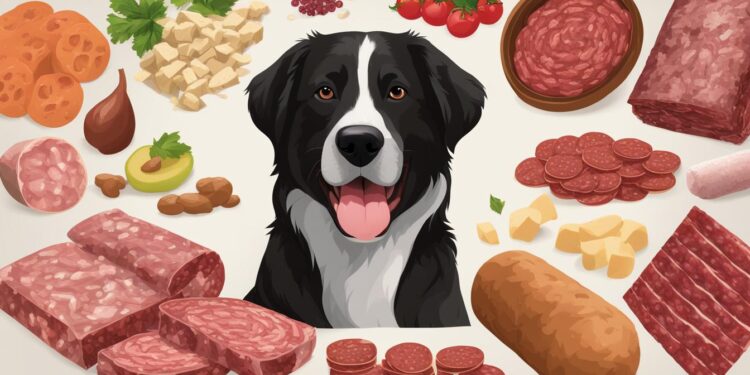Salami for Dogs: A Comprehensive Guide

Salami is a popular cured meat enjoyed by many, but can dogs have salami? Unfortunately, the answer is no. Salami is not safe for dogs to eat due to its high-fat content and the presence of seasonings and additives that can be harmful to dogs. The high-fat content can lead to weight gain, pancreatitis, and other health issues. Additionally, the seasonings and additives in salami, such as garlic and onion, can be toxic to dogs and cause gastrointestinal distress. It’s best to avoid feeding salami to your furry friend and opt for healthier, dog-friendly treats instead.
Key Takeaways
- Salami is not safe for dogs due to its high-fat content and harmful seasonings.
- The high-fat content in salami can lead to weight gain and pancreatitis in dogs.
- The seasonings and additives in salami, like garlic and onion, can be toxic to dogs.
- Choose lean meats, fruits, vegetables, eggs, rice, or pasta as alternative, dog-friendly treats.
- Always consult your veterinarian before making significant changes to your dog’s diet.
The Risks of Salami for Dogs
Salami can pose several risks to dogs. The high-fat content in salami can lead to weight gain, obesity, and pancreatitis, which is a painful and serious condition characterized by inflammation of the pancreas. The seasonings and additives in salami, such as garlic and onion powder, can be toxic to dogs and cause gastrointestinal distress or damage to their red blood cells. Dogs with certain health conditions, like pancreatitis or food allergies, should never consume salami. It’s important to be aware of the potential risks and avoid feeding salami to your dog.
Salami is high in fat, which can lead to weight gain, obesity, and pancreatitis in dogs. The seasonings and additives in salami, such as garlic and onion powder, can be toxic to dogs and cause gastrointestinal distress or damage to their red blood cells. Dogs with certain health conditions, like pancreatitis or food allergies, should never consume salami. It’s essential to prioritize your dog’s health and well-being by avoiding salami and opting for healthier, dog-friendly treats instead.
Risks of Salami for Dogs
| Risks | Effects |
|---|---|
| High-fat content | Weight gain, obesity, pancreatitis |
| Seasonings and additives | Toxicity, gastrointestinal distress, damage to red blood cells |
| Dogs with health conditions | Increased risk and severity of symptoms |
Avoid feeding salami to your dog to protect them from the risks associated with its consumption. Instead, consider providing your dog with healthy, dog-friendly treats that are safe and nutritious. It’s always best to consult with your veterinarian regarding your dog’s dietary needs and any specific health concerns.
Alternative Treats for Dogs
While salami is not safe for dogs, there are plenty of alternative treats that are healthy and safe for your furry friend. Here are some options:
Lean Meats
Lean meats, such as skinless, boneless chicken or turkey, can be a great source of protein for dogs when cooked thoroughly and without seasonings. These meats provide essential nutrients and can be incorporated into your dog’s diet as a tasty treat or as part of their regular meals.
Fruits and Vegetables
Fruits and vegetables are also safe and nutritious options for dogs. Apples, blueberries, carrots, and green beans are excellent choices. They offer vitamins, minerals, and fiber, which can support your dog’s overall health. Just make sure to remove any seeds, pits, or parts that might be harmful to your dog.
Cooked Eggs
Cooked eggs can provide a protein boost for dogs. They are a complete source of amino acids and can be an excellent addition to your dog’s diet. However, it’s crucial to cook the eggs thoroughly to eliminate the risk of salmonella contamination.
Rice or Pasta
Plain rice or pasta can also be included in your dog’s diet in small quantities for added variety. These grains can serve as a source of carbohydrates and provide energy for your furry friend. Remember to cook them plain without any seasoning or sauces that might be harmful to dogs.
It’s important to introduce new foods gradually and in moderation to avoid digestive upset or allergies. Always consult your veterinarian before making any significant changes to your dog’s diet.
| Treat Option | Description |
|---|---|
| Lean Meats (Chicken or Turkey) | High in protein and can be cooked without seasonings |
| Fruits and Vegetables (Apples, Blueberries, Carrots, Green Beans) | Nutritious options with essential vitamins and minerals |
| Cooked Eggs | Protein-rich treat when cooked thoroughly |
| Rice or Pasta | Plain grains for added variety and a source of carbohydrates |
Always prioritize your dog’s health and well-being by opting for healthy and safe treats. Avoid feeding them salami or any other foods that may be harmful to dogs.
In Conclusion
After careful consideration, it is clear that dogs should not consume salami. Salami is packed with high levels of fat, seasonings, and additives that can be detrimental to a dog’s health. The excessive fat content in salami can contribute to weight gain, leading to obesity and potentially serious conditions such as pancreatitis.
In addition to the high fat content, the seasonings and additives in salami, such as garlic and onion, can be toxic to dogs. These ingredients can cause gastrointestinal distress and even damage the dog’s red blood cells. For the sake of your furry friend’s well-being, it is best to refrain from feeding them salami.
To promote and maintain your dog’s optimal health, it is advisable to choose healthier alternatives for treats. Lean meats such as skinless, boneless chicken or turkey, without any seasoning, can serve as a great protein source. Fruits like apples and blueberries, as well as vegetables such as carrots and green beans, can also be safe and nutritious choices for your dog.
Remember, every dog has unique dietary needs, so it’s always prudent to consult with your veterinarian for personalized advice. By prioritizing your dog’s health and avoiding salami, you can ensure a long and happy life for your beloved furry companion.
FAQ
Can dogs eat salami?
No, salami is not safe for dogs to eat due to its high-fat content and the presence of seasonings and additives that can be harmful to dogs.
What are the risks of feeding salami to dogs?
Salami can pose several risks to dogs, including weight gain, obesity, pancreatitis, and gastrointestinal distress. Seasonings and additives in salami, such as garlic and onion, can be toxic to dogs and cause further health issues.
What alternative treats can I give my dog instead of salami?
Lean meats like skinless, boneless chicken or turkey, fruits and vegetables, cooked eggs, plain rice or pasta can be healthy and safe alternatives to salami for dogs.
Should I consult my veterinarian about my dog’s diet?
Yes, it’s always important to consult your veterinarian before making any significant changes to your dog’s diet to ensure their specific dietary needs are met.







